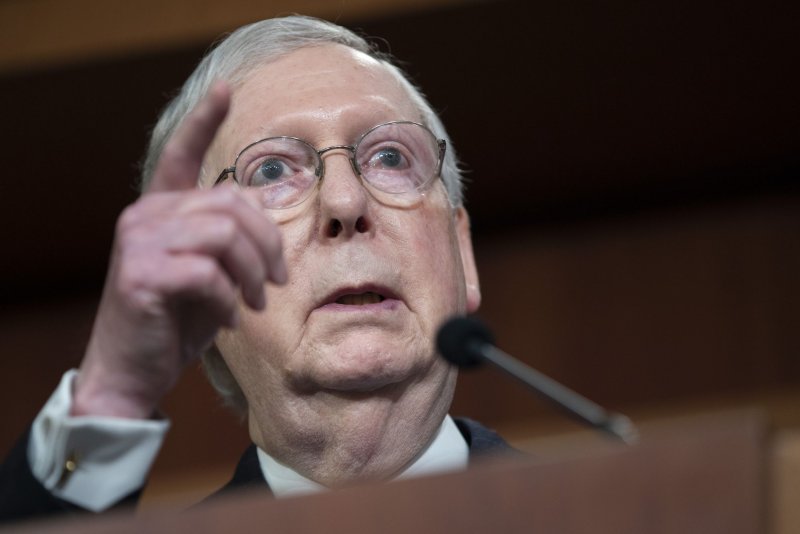1 of 2 | Senate Republican leader Mitch McConnell speaks on Capitol Hill in Washington, D.C., on Tuesday. Photo by Tasos Katopodis/UPI |
License Photo
March 22 (UPI) -- Senate Democrats on Sunday blocked a nearly $2 trillion coronavirus stimulus bill they said was geared more to helping businesses than the American public during the pandemic.
The legislation, which was introduced by Republicans on Thursday, failed to advance on a 47-47 procedural vote with 60 votes needed to pass.
Among the six lawmakers to abstain from voting was Sen. Rand Paul, R-Ky., who became the first U.S. senator to test positive for the coronavirus.
A statement posted on his Twitter account read that he "is feeling fine and is in quarantine. He is asymptomatic and was tested out of an abundance of caution due to his extensive travel and events. He was not aware of any direct contact with any infected person."
Sens. Mitt Romney, R-Utah, and Mike Lee, R-Utah, who also abstained from voting, both announced that they had self-quarantined.
After the vote failed, Senate Republican leader Mitch McConnell of Kentucky criticized the Democrats on the Senate floor, stating there had been some 48 hours of bipartisan negotiations, accusing them of "fiddling" with the emotions, healthcare and the markets of the American people.
"The American people expect us to act tomorrow and I want everyone to fully understand, if we aren't able to act tomorrow, it'll be because of our colleagues on the other side continuing to dither when the country expects us to come together and address this problem."
Senate Democratic leader Chuck Schumer of New York responded that the negotiations weren't bipartisan and that the bill "has many problems," specifically a large corporate bailout that contains no protections for workers and little oversight.
"Also very troubling in the bill were significant shortfalls of money that our hospitals, states, cities and medical workers desperately needed," he said. "This is a public health crisis. It is inexplicable to skimp on funding to address the pandemic."
House Speaker Nancy Pelosi, D-Calif., on Sunday signaled that the House might not approve the bill, which Democrats have criticized as pro-business instead of pro-worker.
"From my standpoint, we're apart," she said when asked about a potential deal on Sunday.
Treasury Secretary Steven Mnuchin earlier told Fox News Sunday that the bill was designed to stimulate the economy over a 10- to 12-week period.
"We need to get the money into the economy now. If we do that, we think we can stabilize the economy," he said. "I think the president has every expectation that this is going to look a lot better four or eight weeks from now."
Mnuchin said the first part of the bill includes what he called "small business retention loans" as many businesses closed while the federal government has suggested people remain home to prevent the spread of COVID-19 and some states have ordered mandatory closures.
"If you're a small business, you'll get two weeks of cash flow to pay your workers. You'll also get some overhead, and if you do that, your loans will be forgiven," he said.
The bill would also provide direct deposits, which Mnuchin said would see an average family of four receive about $3,000, along with enhanced unemployment insurance for people who have been laid off as a result of the outbreak.
Mnuchin said the bill includes a "significant package" developed in conjunction with the Federal Reserve to infuse money into the economy.
"We'll have up to $4 trillion to support liquidity that we can use to support the economy," he said.
President Donald Trump on Sunday told reporters that McConnell and Schumer were working to quickly pass the legislation that he framed as bipartisan.
"They worked late into the night last night and started early this morning, and we are working to pass that legislation on Monday in both the House and the Senate," he said.
However, Sen. Elizabeth Warren, D-Mass., said it wasn't a bipartisan bill but "a Republican proposal."
Concerning possible COVID-19 infections among lawmakers, Senate Republican Whip John Thune of South Dakota said on the Senate floor that senators will be seeking medical advice.
"We'll consult with the attending physician here at the Capitol about appropriate measures for those of us who have been in contact with the senator, but this is the kind of situation that Americans across the country are dealing with right now and it underscores the importance of acting immediately to deliver more relief for the American people," Thune said.
Earlier in the week, U.S. Reps. Mario Diaz-Balart, R-Fla., and Ben McAdams, D-Utah, tested positive.
Diaz-Balart told NBC News on Saturday he is feeling better after a week, but said the initial symptoms hit him "like a ton of bricks." McAdams told NBC's Today last week he "felt like I had a belt around my chest, and so I couldn't breathe deeply."















